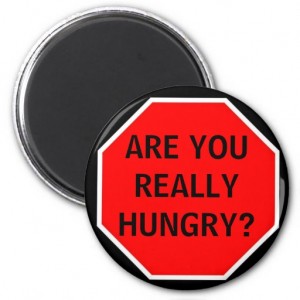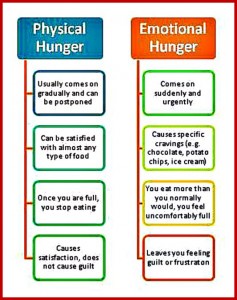 Hunger. Do you really understand what it is?
Hunger. Do you really understand what it is?
Hunger is a signal that your body sends out that helps to maintain the state of our bodies, highly evolved survival machines built to withstand periods of harsh conditions. The human body is finely tuned and very sensitive to reductions in food intake so when you try and go for long periods of time without eating, your body quickly responds in an attempt to curb your intent.
The hunger that most of us feel in actuality has nothing to do with a real need for food. Many times we are fooled into believing we are hungry by our hormones or the brain.
There is more than one type of hunger that is effecting you and controlling the way you eat. The delicate hunger control systems identify when energy and fuel is needed but they can become out of balance and go haywire causing you to receive wrong signals. This in turn causes you to eat when you do not need to eat or you keep eating even though you are full.
The number one hormone that needs to be kept in check in regards to hunger is insulin. The role of insulin in the weight loss story is as a signaler to your fat cells that they should mop up excess glucose (or blood sugar) in the blood and convert it into fat for storage as a future energy source.
Physical, hormonal, nutritional and learned hunger are all forms of hunger and you will experience one or all types during the course of the day depending on your habits.
Physical hunger is the most obvious one. This type of hunger happens when the stomach has been empty for several hours. The longer you wait to eat after first feeling this signal, the more intense it becomes.
Physical hunger surfaces after you have exhausted your easily accessible energy stores through intense work-outs or exercise sessions or after finished manual physical work. Your body sends a signal that it needs a refresher on nutrients and energy. Normally as soon as you eat you will feel relief from this kind of hunger.
Without experiencing this kind of hunger we would never know when the body’s fuel tank was on empty. It’s the body’s way of asking for a refill so that it does not have to tap into its reserves that it is trying to hold onto when food is really scarce.
One of two self-preservation methods kick in when the body either thinks that food is scarce or is denied the proper nutrients it needs for functioning.
- Your metabolic rate (the rate your body burns fuel) is slowed to conserve energy.
- An uncomfortable state of hunger is established which is your body’s attempt to drive you to find food and eat it.
Next on the list is hormonal hunger. This type of hunger usually comes on suddenly and quickly and often has nothing at all to do with meal time. This kind of hunger can actually strike you right after you have eaten a meal and cause wild irrational cravings for specific foods-especially high sugar or high carbohydrates. It can be so insistent as to create a near continual desire to eat…a severe challenge for the most determined of dieters.
“Emotional eating” is a term often associated with this kind of hunger because human emotions have been linked as the trigger for this pattern of eating. Hormonal hunger can leave you with mood swings, anxiety, and low energy.
This type of eating has been the “fall guy” for many people looking for excuses to their eating behavior but science is revealing that it may not be down to human emotions at all. It might simply be the result of various “out of balance” hormones.
The last time you attacked a bar of chocolate when you were not even hungry was hormonal driven. It is extremely compelling and hard to resist.
Nutritional hunger strikes when the body is starved of nutrients…critical vitamins, minerals, phytonutrients and enzymes. Eating a diet of grain-based carbs or other equally deficient processed and refined foods will not provide these and so your body sends out messages to continue eating even when you have consumed far more calories than needed for energy.
Last on the list is learned hunger. This kind of hunger can be the conduit to overeating by virtue of bad eating habits. It is a learned hunger by the body. Eating in front of the TV is a learned behavior and will present itself every time you watch TV. These are subconscious associations based on forced eating habits and learned hunger.
One of the main reasons the average person today continues to become fatter with each passing year and become anything from mildly overweight to obese is that their appetite control system hormones are out of balance.
If you identify with these types of hunger and you’re ready to make a change, I can help.
You can slim down for good once and for all and get your appetite control system humming correctly. “Rebound Free Weight Loss” will take you by the hand and teach you everything you need to know about dieting and exercise and what it really takes to win the weight loss battle once and for all.

Speak Your Mind